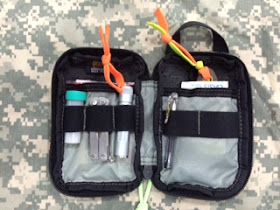One is cold, wet, tired, dark at the end of a long day's trek, one slips and falls, the injuries are a deep cut maybe, you cannot walk steadily, your companions have gone ahead and are out of earshot. You reach for your rucksack and find that you have lost it in the fall.....
This is just the situation when whatever you have in your pocket is all you have to help you get out of trouble. I had published a Personal Pocket Kit (PPK) list in my blog in November 2014, but my extensive experience since has made me modify this kit substantially to be more realistic in what I need now. I hesitate to call it a 'survival kit', a very fashionable term in many EDC sites, so I just call it my PPK.
I have been trekking quite a lot with a camera, sometimes in company, sometimes alone and very often have had to use my kit to help myself or others around me. Just the fact I have it on me all the time makes me confident.
Before I list what I have in my PPK, a few words of advice:
- Use the best equipment you can, don't buy cheap copies of anything, remember sometimes your very life may depend on it.
- Always make sure the medicines you carry are current and fresh AND YOU KNOW HOW TO USE THEM.
- I avoid packaged survival kits because they are packed with many items you may not need and use cheap items to keep the cost down. I always make my own.
- Practise or know how to use every item in your kit, sounds basic but you will be surprised at how many people fail in this. If you have a fresnel lens to start a fire, do it at least once at home and see if it works.
 |
The Maxped case, fits easily in a pocket. I have changed the
zipper cord to a luminous one |
Now coming to the kit itself, first it is important to have a compact, reasonably water resistant container. I used to use an Altoids tin (very popular) but as my kit has grown to be more 'me' specific, I needed a bigger container and so use a Maxpedition Micro. It is convenient to carry and easy to use. The Altoids container was too tight a fit and I am not entertained with doing an exact fit of a neatly packed box on a cold, dark and rainy night.
 |
The Maxped case opened, notice that nothing will fall when the case
is opened |
 |
| The entire kit laid out |
- Torch. I cannot emphasise enough the need for a GOOD quality compact torch. There are many out there, but I use a Nite-Eze Inova. The brightest single AAA cell torch I have used. For longer outings I keep a spare cell as well.
- Knife. I prefer a small fixed blade, the Boker Gnome here, but also use an Opinel No 6 sometimes.
- Multi-tool. For the scissors mainly. Leatherman Micra or SAK Classic.
- Whistle. Invaluable to draw the attention of your buddies or rescuers, a whistle needs much less energy and carries much further than the human voice.I use either the Tops Knives one or a mini Fox-Pro. Best keep it small and flat.
- Small Tube containing two needles threaded with dental floss, floss is very strong and can be used to stitch shoes, rucksack straps or buttons; more versatile than thread. keep the needles threaded, it is nearly impossible with cold wet hands in the dark. the tube also has a pair of tweezers and assorted size safety pins.
- Paper and Pen
- Small fire starter
- Fresnel lens. to see splinters thorns in the skin, nature close up, fire starter.
- Money for emergencies
- Medicine Kit. This is for emergencies only, I carry a more comprehensive first aid kit in my rucksack. In the PPK I carry two tabs each for headache, body ache, loose motions, four bandaids, two alcohol swabs, antiseptic cream in one time use sealed drinking straws, made by me.
- Water Sterilisation Tablets. Please them all the time when using unfiltered water outdoors.
- String. The length and thickness of a long shoelace can be a versatile aid to tying anything, including replacing shoelace. (try, some day, to walk with your shoelaces untied and you will know what I mean.) Into this I have tucked one long Safety pin.
 |
| Detail |
 |
| more detail |
There are many other things to carry, but these are essential. Remember, if it's not on you you cannot use it. if the PPK becomes unwieldy you won't carry it, and then you can't use it. If required in a multi-day trek, carry another, slightly larger and more comprehensive kit in your rucksack.
If you make a good compact kit you will carry it whenever outdoors, and that is a good practise.



























